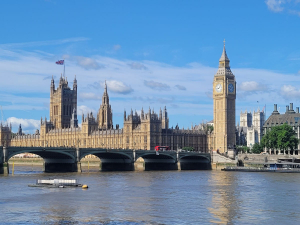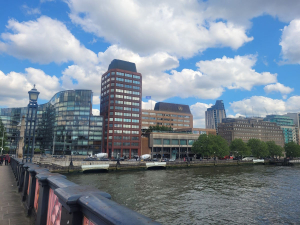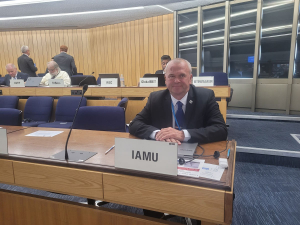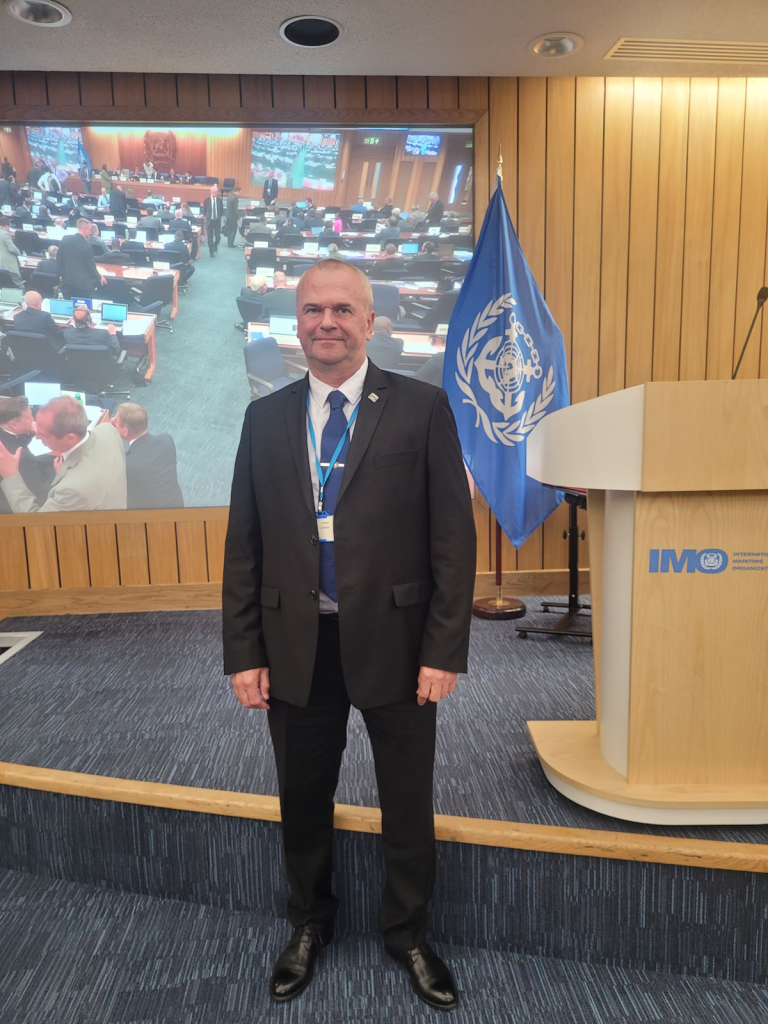The 110th session of the Maritime Safety Committee of the International Maritime Organization (IMO MSC 110) was held in London from June 18 to 27. The International Association of Maritime Universities was represented at IMO MSC 110 by Capt. Dmytro Zhukov, a senior lecturer at the Shiphandling Chair of the National University “Odessa Maritime Academy”.
During the IMO MSC 110, the following issues were considered:
- 1 Adoption of the agenda; report on credentials
- 2 Decisions of other IMO bodies
- 3 Amendments to mandatory instruments
- 4 Goal-based new ship construction standards
- 5 Development of a goal-based instrument for maritime autonomous surface ships (MASS)
- 6 Development of a safety regulatory framework to support the reduction of GHG emissions from ships using new technologies and alternative fuels
- 7 Revision of the Guidelines on maritime cyber risk management (MSC-FAL.1/Circ.3/Rev.2) and identification of next steps to enhance maritime cybersecurity
- 8 Measures to enhance maritime security
- 9 Piracy and armed robbery against ships
- 10 Unsafe mixed migration by sea
- 11 Ship design and construction (Report of the eleventh session of the Sub-Committee)
- 12 Pollution Prevention and Response (Report of the twelfth session of the Sub-Committee)
- 13 Human element, training and watchkeeping (Report of the eleventh session of the Sub-Committee)
- 14 Ship systems and equipment (Report of the eleventh session of the Sub-Committee)
- 15 Navigation, communications and search and rescue (Urgent matters emanating from the twelfth session of the Sub-Committee)
- 16 Carriage of cargoes and containers (Report of the tenth session of the Sub-Committee)
- 17 Application of the Committee’s method of work
- 18 Work programme
- 19 Election of Chair and Vice-Chair for 2026
- 20 Any other business
- 21 Consideration of the report of the Committee on its 110th session
On the first day of the session, IMO Secretary General Arsenio Dominguez delivered a welcome speech. Given the increasing number of recent incidents, he urged all Member States and the maritime industry to:
- improve compliance with IMO international standards;
- exercise enhanced vigilance and navigational safety;
- ensure emergency preparedness and rapid response capabilities; and
- strengthen cooperation and information sharing to safeguard seafarers, vessels, and marine environment.
The Secretary General also drew attention to the problems of piracy, armed robbery at sea, organized crime such as smuggling of weapons, drugs and people. He noted further development of a non-mandatory MASS Code and continue developing the assessment of identified alternative fuels and technologies, examining safety obstacles and gaps in the current IMO instruments, in order to provide clear instructions to relevant sub-committees to prepare new instruments or amend existing ones in support of the safe delivery of IMO’s GHG reduction strategy. MSC 110 have to consider the next steps on the development of cybersecurity standards for ships and port facilities to address the security challenges due to increasing maritime sector digitalization and the ongoing comprehensive review of the STCW Convention and Code. He pointed out that, this year’s World Maritime theme: “My Harassment-Free ship”.
The full text of the IMO Secretary General’s speech can be viewed at the following link:
https://www.imo.org/en/MediaCentre/SecretaryGeneral/Pages/MSC-110-Opening-remarks.aspx
On the last day of the session Mr. Theofilos Mozas (Greece) was unanimously elected as IMO MSC Chair and as Vice-Chair, both, for 2026.
A number of presentations were also presented during IMO MSC 110:
- Enhancing MASS Remote Operator Training: A Quantitative Evaluation of Navigation Performance Using Simulators (Republic of Korea)
- International Legal Regime on Merchant Shipping in the BlackSea and the Sea of Azov (Ukraine)
- ATLANTIC CENTRE – Building an Atlantic Community of Interest (Portugal)
- Nuclear technology for shipping: The way forward (WNTI)
- Power Drives Propulsion (CIMAC)
- The YARIS project and the Yaoundé Architecture for safeguarding maritime security in the Gulf of Guinea (European Commission and France)
- Hydrogen as a maritime fuel – Bunkering and onboard systems of operational vessels (ZESTA)
- Impact of the IMO Compendium on Facilitation and Electronic Business within the work of the MSC (EGDH)
- Guidelines to develop and implement a Safety Management System for ships using alternative fuels, including ammonia (Singapore)
- MASS now and next steps (One Sea Ry)
- Innovative on-board MCH hydrogen production: analyzing current regulatory framework (Japan)
- The role of training in safe marine decarbonization (Finland)
- Novel LSA & MSC.1/Circ.1212 (Bahamas)
- EU Twinning project Italy – Ukraine: Institutional support to the State service for maritime, inland waterway transport and shipping of Ukraine in the implementation of the EU Acquis, norms and standards on maritime safety (Italy)







